PRO BUILDING SERVICES
A Guide to House Renovations Swansea


* Indicates required field
Home renovation is, without a doubt, one of the most costliest investments that a lot of people today can make. Whether you are planning to do the work yourself, you are working with a contractor, or pooling your resources together in a home refurbishment project with friends and family; you will find that every penny you spend will have an effect on your home’s look and appeal.
However, your efforts to creating a knockout home renovation in Swansea won’t be without its obstacles. Between work permits, unique local authority guidelines and health and safety requirements to meet, the do’s and dont’s of house renovations in Swansea can be challenging. But with our beginner’s guide, you will be well positioned to tackle whatever renovation project that comes your way
The Significance of House Renovations in Swansea
Home renovations are exciting and often profitable ventures, but they can also be extremely daunting and come with a fair share of stress. However the key to realizing success with any type of renovation is proper preparation and planning. If you get this right then you’re well on the road to success
It’s also important to be aware that whenever you embark on a large house renovation project, challenges, setbacks and surprises will always be presenting themselves. Things will go wrong and situation will test you- therefore adopting a mindset that not only accepts but embraces all this will put you in good stead.
Moreover, renovations can also come with lots of hidden costs, pre-empting when they’re likely to happen and having a step-by-step plan of how to deal with them will help greatly in keep the project on schedule and within budget.
Home Renovations Swansea- Where To Start:
Knowing where to start on a big renovation project can be overwhelming and often tricky. Unlike the construction of a new property or home extension where you’re building from scratch, a home renovation requires a slightly different approach as you’re working on a property that already has it’s own personality and pre-existing characteristics.
The most important thing from the outset is that you know what it is you want to achieve from your Swansea home renovation based on the knowledge and understanding you have on the existing property you wish to renovate.
Below we’ve laid out a step-by-step process that will help ensure your renovation project is not only enjoyable and as stress free as possible but also profitable
1. Finding and Assessing Your Project
First things first, you will obviously need a house to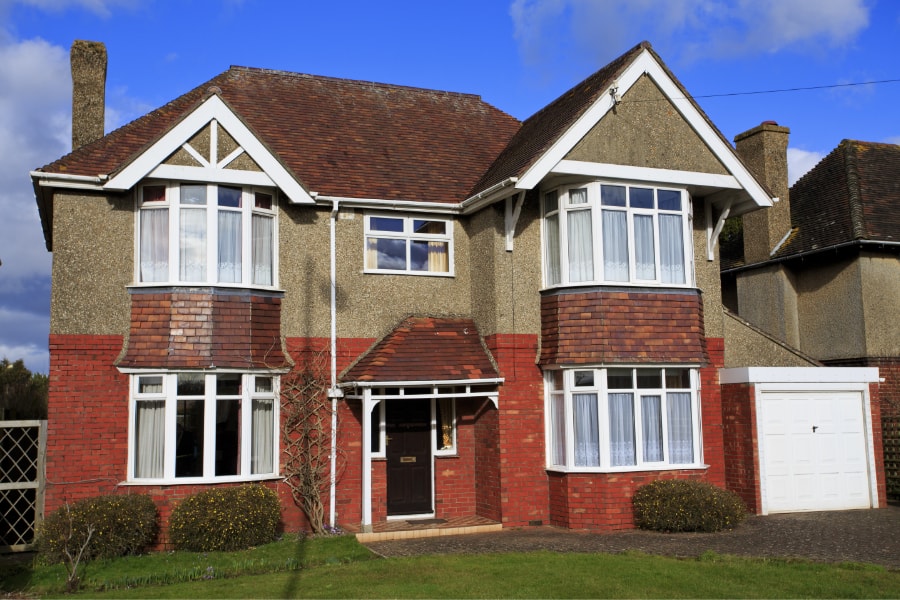 renovate in Swansea. Every property has some scope for home renovations, and even a home with no obvious flaws might need some supplementary home renovations to enhance it and bring it to life. To start your search, you can contact all the estate agents in the area, check your local newspaper or use property websites like Rightmove or Zoopla. Utilising these services or resources, your property prospect can quickly be narrowed down to possibilities that suit all your needs.
renovate in Swansea. Every property has some scope for home renovations, and even a home with no obvious flaws might need some supplementary home renovations to enhance it and bring it to life. To start your search, you can contact all the estate agents in the area, check your local newspaper or use property websites like Rightmove or Zoopla. Utilising these services or resources, your property prospect can quickly be narrowed down to possibilities that suit all your needs.
Before you decide on the right property for you, here are some of the things you need to consider before you part with any of your hard earned cash.
- Find out what works other properties in the neighbourhood have completed such extensions, conversions, part-renovations etc
- Does the property have sufficient space to the side and/or to the rear to add a new home extension?
- Use sites like Rightmove to establish recent sales prices on properties that have completed renovations or added extensions to see if there was an uplift in value and that properties in area do not have price ceiling
- This is a given. Make sure you appoint a chartered surveyor to carry out a property survey to check there are no issues with infestations, subsidence, damp or problems with drainage.
- Have a measured survey carried out of the existing layout of the property. This survey will include detailed drawing which you will require for any planning applications that you will need to submit.
Arm yourself with a comprehensive list of requirements and set a priority in terms of the necessities you want to meet. Once you have picked a home, it’s time to assess the existing construction to see exactly what renovations are needed.
2. Your Scedule of Work
With all Swansea home renovations, a schedule of works is essential. A schedule of works is in simple terms a list of all the jobs in chronological order that need to be completed for the renovation from start to finish. It’s also recommended to include who is responsible for completed each job and the costs for each.
A schedule of works will not only help you stay organized, but if you’re working with a home renovations contractor then this can also serve to act as a loose binding contract between you and them to ensure the whole project stays on track and within the agreed budget.
A typical schedule of works could consist of the following:
- Surveys, building report to assess current condition.
- Instruct an architect/designer/structural engineer
- Statuary Consents (Planning, Building Regulations etc)
- Site Access
- Stability Work & Structural Repair
- Demolition Work
- Major Construction Work (External Walls/Exterior)
- Weathertight- (Roof Covering, Windows & Doors)
- First Fix
- Plastering & Drying Out, Flooring
- Second Fix
- Decorating & Finishes
- Snagging
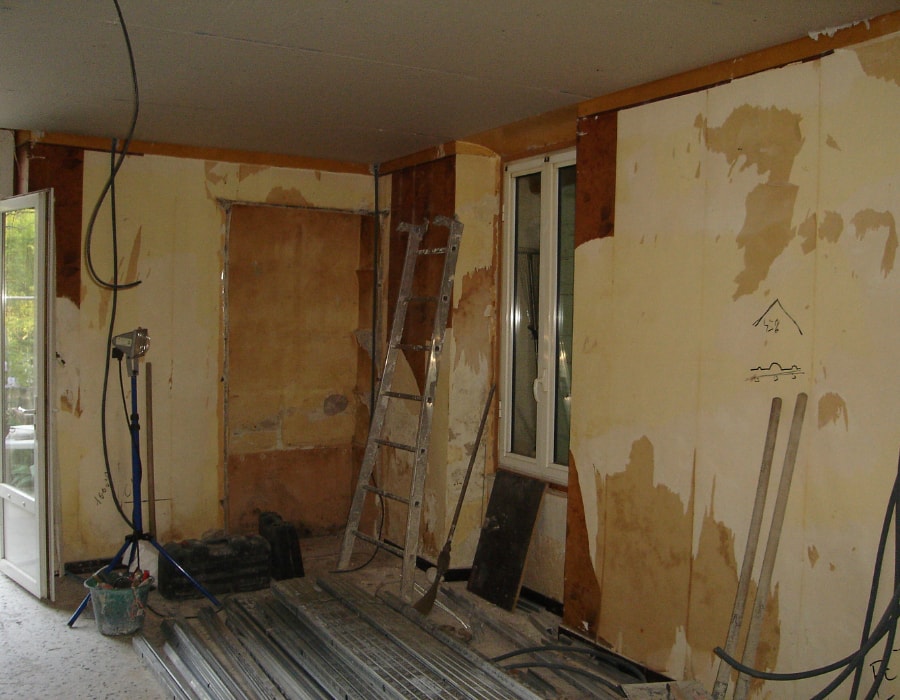
3. Will I Need Planning Permission To Accomplish My Renovation in Swansea?
Dependent on what alterations you’re making to the property that you’re renovating there are a few permissions that you need to be mindful of before commencing any work. These include:
- Local Authority Planning Permission
- Building Regulations Approval
- Listed Building Consent
Generally speaking, if you’re not altering the footprint of the house then it’s very likely you will not require local authority planning permission.
However if certain elements of your house renovation project do require planning permission then in order to avoid delays commence tasks on the schedule of works that don’t require any of the consents mentioned above.
As we mentioned, in the majority of cases, permissions will not be required for house renovations as they’ll mostly come under what they call ‘permitted development’. These include such things as:
- Single and Double Storey Extensions
- Garage Conversions
- Loft Conversions
- Conservatories
- Decking Areas
Typical cases where planning permission is going to be likely however is if you’re looking to alter or extend the roofline of the existing property. Likewise if you’re renovating a listed property or it’s located in a designate area that it’s almost certain you will require consent before you commence any type of work.
Also if the property you’re renovating is either a semi-detached or terraced, and the building work you’re carrying out may affect a shared wall you have with your neighbour, then it’s in your interests to serve them a Party Wall Agreement before you commence any work.
4. Should I Invest in an Architect for My Home Renovation in Swansea?
Hiring an architect is not always necessary when renovating your property , however if you’re undertaking a large scale project, adding an extension or it’s a listed building then it’s highly recommended you seek professional architectural advice.
You have numerous options to choose from when designing your renovation project i.e. an architect, house designer, or a structural engineer. All have the necessary professional expertise to provide ideas, advice and solutions for your renovation requirements. They’ll also assist in creating drawings and designs based around your requirements, help and guide you through the planning process as well as offering advice on costings and working within your budget.
5. Do I Require Building Regulations Approval For My Home Renovation?
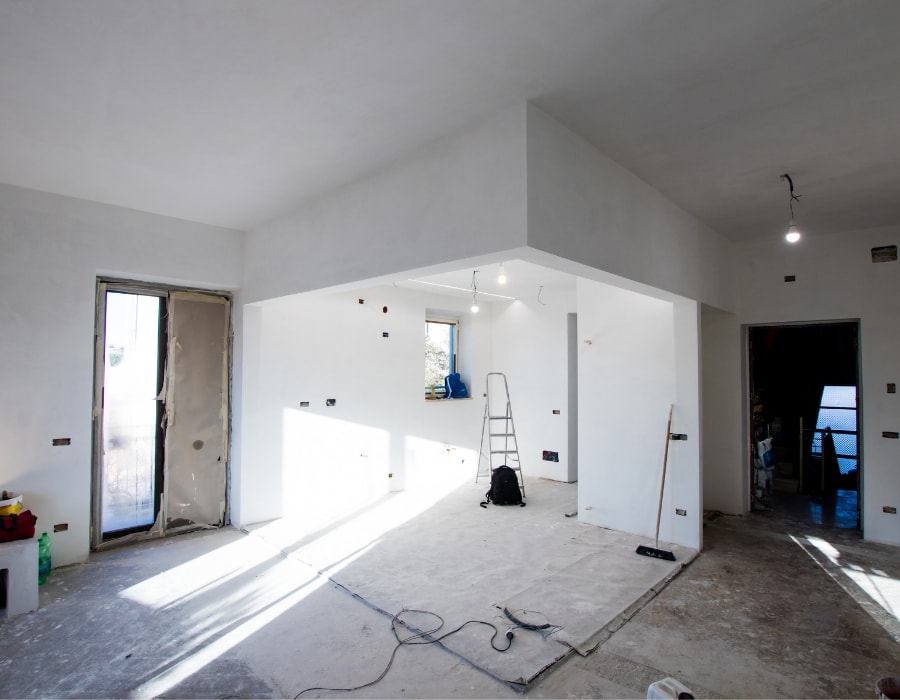
Building Regulations is required for all new buildings, extensions, major services alterations, underpinning of foundations and buildings that have a change of use for example barn conversions.
Building regulations ensures all building work is completed to the correct standards i.e. the building is both safe and structurally sound, energy efficient and suitable disability access.
Building Regulations approval are typically exempt however for the construction of single-storey detached buildings smaller than 30m2 is size or structures that are less than 15m2 in size providing they don’t consist of any sleeping accommodation.
In addition, you will not require building regulations approvals for any type of repairs providing you’re replacing materials that are like for like.
If for any reason you’re still unsure of whether any work you’re carrying out on renovation requires approval then we’d advise you get in touch with a reputable building control officer in your area.
6. Retaining Existing Features
With lots of home renovations, retaining all or some of the existing or original features that add to the character and charm of the house holds great appeal for many people.
Unfortunately however, some older properties that have suffered years of neglect, it’s quite likely that many of these quirky original features would be either missing or beyond repair.
If this is the case then rather than adding additional and unnecessary costs to your project it’s important you consider which features are worth reclaiming or saving and which are those you can add at a later date.
When retaining the charm and character of your house renovation there are certain features that typically you need to pay attention and include such things as:
- Timber beam
- Doors
- Windows
- Floors
- Fireplaces
- Decorative Mouldings
7. Sufficient Access to Your House Renovation
Large house renovation projects usually require large machinery. Before the project commences you need work together with your local Swansea builder or contractor to establish how and where they can get the required machinery onto the site of your property.
If access for machinery isn’t possible through your own property, then you may need to speak to a neighbour to gain access via their land.
8. The Structural Work Begins
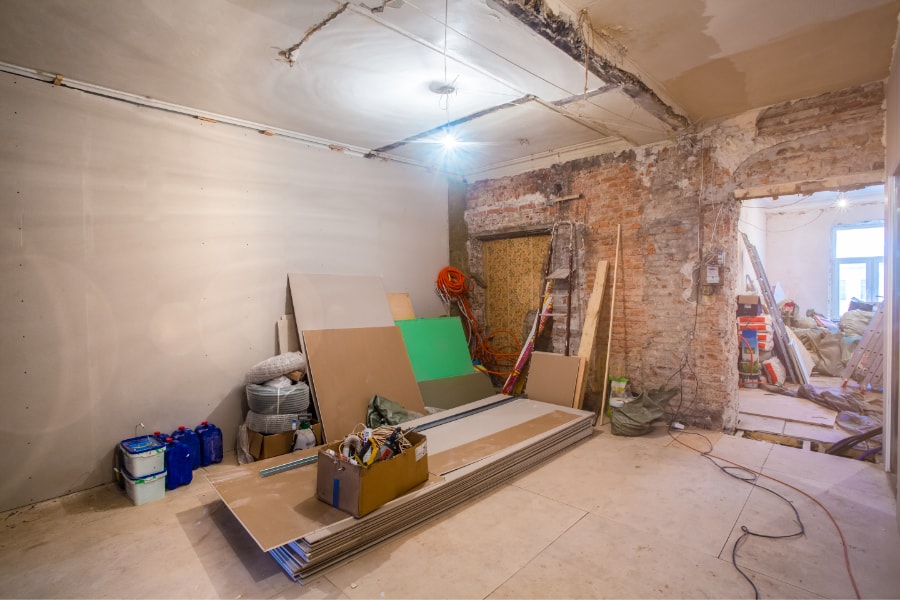 The schedule of work we discussed earlier now really comes into effect. With each job listed in chronological you can follow it stage by stage through to the completion of the project.
The schedule of work we discussed earlier now really comes into effect. With each job listed in chronological you can follow it stage by stage through to the completion of the project.
Dependent on the scale of your home renovation project, construction work could include some pf the following:
- Rendering Exterior Walls
- Adding an extension
- Adding or removing internal walls
- Converting a basement, garage or loft
If you’re adding an extension, or converting a garage or loft as part of your project then once all the major construction work is completed and the roof structure is built, it’s important to make the structure watertight. This will involve felt and battening the roof, and installing and glazing doors and windows. If however the doors and windows haven’t been delivered on site yet, you can board up the openings or even cover over with polythene sheeting.
Making the structure watertight will not only help protect the building from the weather elements but also make it secure.
9. The First Fix
Again dependent on the construction work you’ve carried out for your renovation, first fix work generally consists of the following:
- Internal stud walls frames,
- Flooring,
- Door linings,
- Carpentry (including staircases),
- Plumbing (including drainage and soil pipes etc)
- Wiring (including alarms, sound equipment etc)
- Ventilation and air-conditioning ducts
10. Plastering
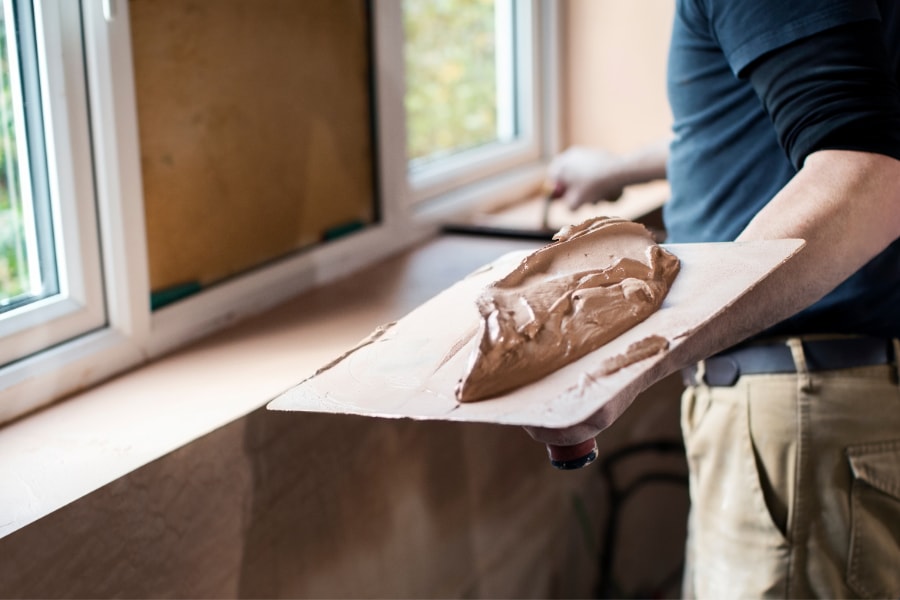
When the first fix is completed, it’s now time to start plastering. This will involve fixing plasterboard to ceilings, dry-lining stud walls as well as repairing plasterwork or mouldings that are damaged.
Once the plastering is finished, flooring screed is then usually laid on the ground floor. However some do prefer to screed first followed by plastering to achieve a cleaner and neater joint between the floor and the plastered wall.
If you want to install underfloor heating, then this is normally done after plastering and obviously before the floor screed so that all the pipes, elements and manifolds are properly covered.
11. Flooring Your New Home Renovation
Before you move on to the second fix stage of the project, it’s highly recommended to lay your chosen flooring first. This not only allows the flooring to run underneath skirtings and architraves to create a neater finish, but it also laying flooring such as ceramic tiles, flagstones
If you’re choosing to lay wood flooring in your new house renovation, then it’s very important you allow a sufficient dry-out period for the plastering and floor screed. The dry-out period can be between 6-8 weeks dependent on the time of year. However the longer you leave it, the less chance you have of moisture negatively impacting the wood flooring as well as other second fix joinery and woodwork
12. The Second Fix
Once the plastering and flooring has been finished the second fix stage can begin. The second fix basically comprises of work such as:
- Hanging doors, fixing architraves, skirtings
- Boxing in soil stack and exposed pipe work.
- Fitting electrical sockets, light fittings, switches, phone and TV points.
- Installing bathroom suite, fittings and taps
- Installing kitchen and appliances
- Installing boiler unit, controls and hanging and connecting radiators
- Testing and commissioning heating system and electrical work
13. Revamping the Exterior
As well renovating the internal aspects of your property you may also wish to give it an exterior makeover.
Such work can include:
- Exterior rendering
- Replacing guttering and downpipes
- Replacing exterior timberwork such as cladding, fascias and soffits
- Landscaping which includes wall construction, paving, patio areas, decking, fencing, turfing and planting.
13. The Final Touches
When all the second fix work is complete and the property is clean and dust-free you can then begin to add the finishing touches. This will include such things as:
- Decorating- Painting and Staining
- Bathroom/kitchen wall tiling
- Laying soft flooring. i.e. carpets or vinyls
- White goods- Fridge, Cooker, Washing Machine.
14. Snagging List
Snagging is the final stage of the renovation project once all the practical work has been completed. A snagging list basically comprises of minor defects or faults with all aspects of the completed work that require remedial work.
Snagging can and should be done as a joint effort by both you the homeowner and building contractor. Both you and the contractor can independently inspect the completed work and compile separate snagging lists to compare, discuss and address. It is also highly recommended for you to inspect all the work with your builder and snag the project together. This not only allows any issues or faults to be dealt with in a timely manner, but it also develops a better understanding of what the issues are and how they occurred.
Once the snagging list is agreed, it is then usually left with the Swansea building contractor to assign a team member to rectify the issues, which generally require minor repair work, decoration, touching up or cleaning.
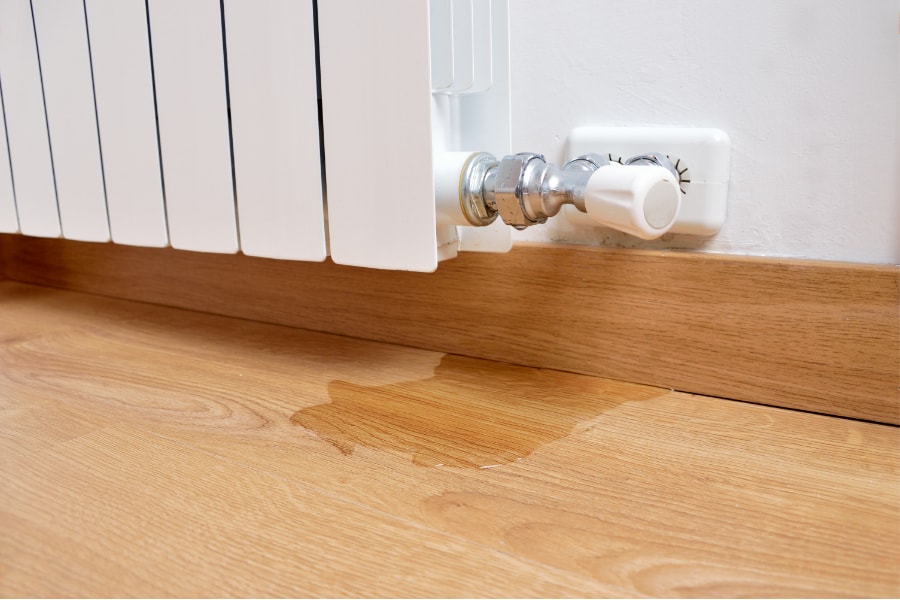
Below are some common snags that arise with house renovation projects…
- Minor leaks
- Paintwork scuffs and scrapes
- Scratches on window panes
- Uneven floors
- Not all keys supplied for windows and doors
- Making good around light, fittings, sockets, tv and phone points
- Some light fittings and sockets not working
- Tiles not fully adhered and/or grouted.
- Incorrect water flow on taps, showers and appliances
- Doors and windows not opening or shutting properly.
15. Budgeting
Establishing a budget for your home renovation in Swansea is as important as the renovation project itself. In addition to the obvious material and labour costs that come with this type of project it’s important you pay close consideration to the additional fees that also need to be covered. These fees include architect’s drawings and design work, planning permissions and building regulations, carrying out specialist surveys, as well specialised building insurance cover and warranties to safe-guard you against sub-standard work, or the contractor you use going out of business
Also, bear in mind that no matter how meticulously you follow your schedule of works, there will still be surprises and setbacks along the way. So, it’s wise to budget for unexpected/unforeseen costs that will inevitable prop along your home renovation Swansea journey
16. Your Typical Home Renovation Costs?
There are a number of factors that determine the cost of your Swansea house renovations project. Some of these factors include the size and location of the property, its age and condition, complexities of the project, as well as the quality of the fixtures, finishes and materials.
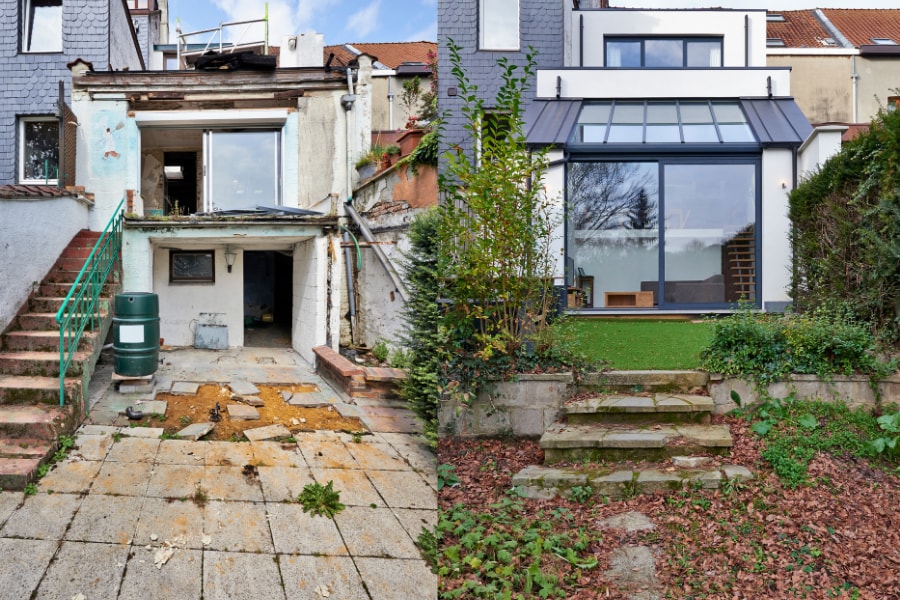
Below are some average costs that you should expect to pay on a house renovation project:
- Extensions: £20,000- £40,000
- Loft Conversions- £15,000- £40,000
- Bathroom Renovation £3,000-£5,000
- Kitchen Renovation- £7,000- £20,000
- Rewiring- £4,000- £5,000
- New Windows- £2,500- £6,000
- New Heating System- (Combi boiler & radiators)- £5,000- £6,000
Conclusion
With this comprehensive guide, hopefully it will provide you with the insight into what’s involved and what’s required in order to realize your dream home renovation. Living in a home that looks like it came straight out of a design magazine is definitely easier and fun than dragging yourself up daily to the same four walls.
Just remember – you have to approach your home renovations as a project that will take a lot of time and hard work but is well worth it in the end.
Contact Pro Building Services For All Your House Renovations Quotes
Specialising in all kinds of building projects, Pro Building Services has the ability to take care of all of your house renovations in Swansea and the surrounding areas. Boasting 15+ years of extensive experience in the building industry, our team is able to handle all your Swansea house renovations, from planning and design through to construction and completion within the time and budget.
Our home renovations Swansea specialists cover in and across the city as well as the surrounding areas including the Swansea Valleys, Neath, Port Talbot, Llanelli, and Ammanford. Contact us today to get started!
